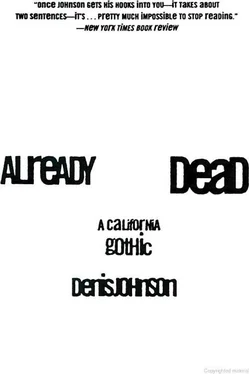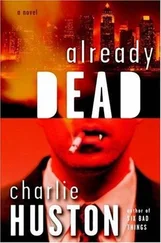Past the boardwalk onto the street, the gauntlet of shops and beachside people, the quantum dregs, the never-ending pavement in their sighs, and always that music: dark rock. And you kept going, beyond the seaside part of town. Homes of stucco in the ashy twilight, the street no longer dabbed with sand. Past the edges, way way past, out into the big place east of town, they call it America. Through the vandalized areas you wandered like a voice.
All the world is sleeping. The sea is sleeping. The sand is sleeping.
One last form besides yourself invested with any waking. Fat black woman on a stool against a wall in a shadow with an accordion across her chest and a silhouetted, spiky ’do. Her skirt drapes empty below her thighs.
— Don’t ask me to play. This thing don’t play.
—
— I don’t have any legs.
—
— You know where you are, don’t you?
—
— California.
—
— You like where you are?
—
Already Dead / 289
— You came a long way to get to California.
—
— You in California now.
—
Why couldn’t you speak? Where in fact was your throat? Why did you have no hands? How could it be you saw right and left and backward — without turning? Had he killed you? He had killed you. Had he stopped your breath, your heart? He had. But you won’t believe me because you I write to are gone. And you who replaced her: you don’t love me.
Okay then Van Ness you murdered her. Strangled her for three minutes in the cool dim amber room while her face turned russet, purple, chalky blue, and the bewilderment evaporated from her eyes and her gaze went upward like a priest’s, an ecstatic’s. Unhooked your cramped fingers from her neck and thumbed wide her eyelids and shone a penlight at her pupils — no reaction — held a mirror to her nostrils — no pinpoints of mist — and pricked her flesh with a needle, and the hole didn’t close — found no pulse in her wrists, none beneath her jaw…
And you sat by the bed in a chair until another demon tickled by you, entering Winona Fairchild’s naked corpse.
290 / Denis Johnson
Billy, Billy, Billy,” Billy said a few minutes before his death at the hands of Carl Van Ness, “you my man Billy are something of a genius. No,” he said, “I’m not — yes, you are,” he said.
“No,” he said, “it’s just inspiration.” He cut the corner on a switch-back, raced to the crest of a bare knoll and stood still at half the height of the surrounding chinkapins, looking at their sickly branches and the tantal-izing mist caught almost like confetti in the underlight, his hard breath the only sound until as it abated he heard the woods again, the birds and the currents and the leaves, and felt the noises almost as if they touched his flesh. Maybe they did. After all, these were vibrations. The laughter of the soul of this place. Maybe too in this way the vibrations of the Mercedes had communicated to his brain, shortcutting past his cogitations, the fact that not the manifold but the dipstick was the source of the runaway oil. The dipstick wasn’t stock, but a changeling, an impostor, its cap just slightly too small for the aperture, and thus at high RPM’s you get oil spraying so bad all through the compartment it drips down onto your head when you raise the hood.
“I have solved the problem.”
He got back to the cabin with a desire to put on a little tea. Black 293
tea, if he had any. Coffee, even. He had some coffee somewhere. Actually he had some Kenya coffee in the bean, in a bag, in the shed. He’d have to get after those beans with a hammer, though. As he thought about it he plucked a pencil from a knothole in the kitchen counterboard and dug in the wood box for some paper, an old San Francisco Examiner he could use the margins of. Sat at the table and forgot about the coffee, tearing the front page into quarters and beginning a note to Clarence.
He got the first sentence down, across the top margin — the good news.
He took off his new hat with its special message, adolescent, obscene, kind of funny, and set it aside and skimmed the sweat from his hairline with his hand. He sat back and put his pencil in his mouth, put his feet up on the table, locked his hands behind his head, and began to consider the list of things they’d need to get the Mercedes saleable, a short list of inexpensive things, now that he’d solved the oil problem. He heard the door behind him opening.
Meadows thought: What are you trying to do to me?
Thinking thus he gassed the rocking Scout over the rise past the Gualala dump and onto the unpaved portion of Shipwreck Road, shortly afterward took a right onto the logging track of the Mendocino Redwoods Company and trespassed through their lands alongside the Gualala River’s Little North Fork, in the bed of the San Andreas Fault, fording the stream several times and stopping finally in a wreck of dust and shade where the lumber corporation’s holdings, and the road, gave out. He was now within two miles of the coast. He pulled the Scout onto the uphill side and fixed it with its rear to the descent, a position made necessary by its lack of any reverse, and made sure of his equipment: a memo pad and something to write with. The government-run Gualala Campground lay near enough by that he could smell a bit of cooking on the currents of the afternoon. Meadows left the jeep and made his way on foot along the river’s western bank until he sighted camp smoke two hundred meters off, across the water, in the same spot where he’d last seen the Silverado and had talked with Harry Lally’s delegation, the two piggers from Del Norte County.
Walked downstream nearly to the bridge, just a few hundred meters above where the river jogged back west and widened, over the course of a mile or so, to make its marshy estuary on the Pacific. Crossed here at the last narrow place,
294 / Denis Johnson
wetting his boots to the cuffs of his jeans. With his back to the water he crouched for several minutes, listening but hearing nothing, and then reconnoitered warily above the embankment’s edge. Smoke strung itself through the boughs, but nothing of the Silverado or its owners showed itself. Climbing over the bank and taking to the drive, he located Carrie’s site; her yellow wagon wasn’t around, but he gathered from the presence of a Styrofoam cooler and a gay plastic deck chair that she and her son still camped here.
The small voices of another party carried to him as he squatted with the notepad open on his right knee and scribbled the pen across its face to get a flow, and though he’d rehearsed and revised his thoughts all the way here and had imagined some kind of statement in full, the weeping of a child and the bursting laughter of several grown-ups slightly distracted him as he struggled with the elements of composition.
He wrote only, What are you trying to do to me. Signed Your Buddy from the Road. PS Hope its the same thing I’m trying to do to you , and tore it off and put it on her deck chair, weighted by a smooth white stone.
Not at all sure what at this point to do with himself, Meadows loitered here a minute, taking the level of his failure. He’d intended to get across to her something about his soul, and her soul, and the certainty of the turnings that had brought them up against each other. The words to a Dead number hovered somewhere just out of memory’s grasp…if he could quote them now, they’d put it over: Till we all fall down/It’ll do you fine/Don’t think about/What you left behind/The way you came/Or the way you go/Let your tracks be lost/In the dark and snow …Possibly these lines had burned down through him when he’d lived with Cath. In fact of course they had. No, then: because echoes wouldn’t do it. She’d sense any echoing quality in his program. She drove up as he stood there with his eyes closed. Her station wagon’s right front tire growled and flapped and her little boy stared at him from the passenger seat. She herself got out and gave a little wave. He leaned low and squinted in at the kid and smiled and crossed his arms over his chest.
Читать дальше












